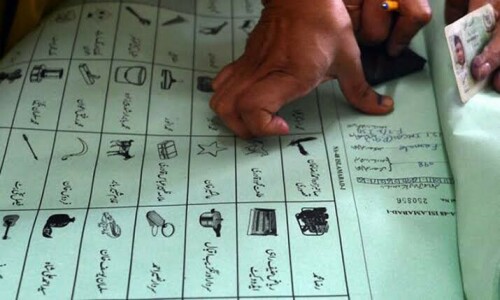KARACHI, Dec 2: Terming an apex court ruling regarding fresh delimitation of constituencies in Karachi before a census an attempt to ‘snatch his party’s mandate’, Muttahida Qaumi Movement (MQM) chief Altaf Hussain said on Sunday that people of the city would never allow any such ‘conspiracy’ to succeed.
Speaking from London to a big public meeting held at the Jinnah Ground in Azizabad, Mr Hussain said the MQM had great respect for the judiciary and it would have no objection if a census was held before the delimitation in accordance with the law.
“But what is the objective of carrying out delimitation only in Karachi without having a census?”
In a hard-hitting speech, he said the MQM had accepted the Oct 1 order of the Supreme Court bench hearing the Karachi violence, calling for fresh delimitation of constituencies.
However, the directive given by another bench on Nov 28 to the Election Commission that delimitation in Karachi should be done in a manner that no single party would have a monopoly was “in contravention of law and the Delimitation of Constituencies Act, 1974”, he said.
The act envisaged census as a basic requirement for new delimitation and the court’s order for taking the step in Karachi alone without holding a census was against its Section 9. “The Delimitation Act does not speak about monopoly of any political party.
The word monopoly is not present in any clause of the act.”
He asked why the order had been issued only for Karachi and not for the whole country. “It is being argued that delimitation of constituencies would improve law and order in Karachi. If this is the case then the law and order situation is at its lowest ebb in Balochistan and Khyber Pakhtunkhwa, but no such directives had been given there.”
He asked the authorities whether they wanted a slogan for liberation to be raised in Karachi also.
The MQM chief said any decision on election related issues was the responsibility of the Election Commission and should be left with it.
“Delimitation of constituencies is not a function of the judiciary. A judicial martial law should not be imposed here.” Mr Hussain said that the people’s mandate given to the MQM should be accepted instead of hatching conspiracies to crush it by declaring it a monopoly.
He requested Chief Justice Iftikhar Mohammad Chaudhry to intervene and take suo motu notice of the remarks about monopoly which, he said, were discriminatory and against Article 25 of the Constitution.
Mr Hussain also said the Lahore High Court should review its recent verdict in which it had asked the federal government to construct the Kalabagh dam. The courts should not take such decisions, he said.
He said the people of Sindh had rejected the controversial project. He also asked the participants of the meeting to raise their hand to show that they once again rejected the dam.
The venue was packed to capacity before the beginning of Mr Hussain’s telephonic speech which was also relayed to 38 other cities. The adjoining streets were also filled with the party’s supporters amid strict security arrangements and all roads leading to the place had been closed for traffic.













































Dear visitor, the comments section is undergoing an overhaul and will return soon.